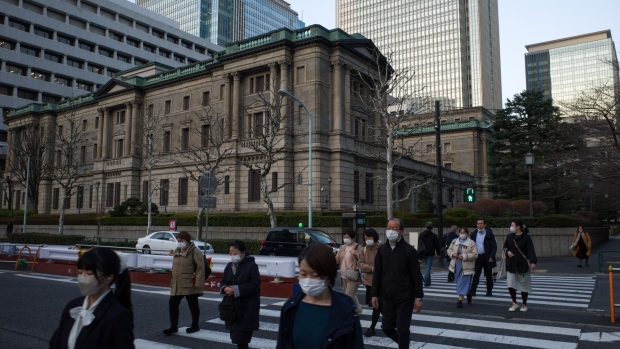Jan 30, 2024
BOJ Opinions Hint at Conditions for a Rate Hike Getting Closer
, Bloomberg News

(Bloomberg) -- The Bank of Japan’s summary of last week’s meeting signal it is stepping closer to raising its interest rate for the first time since 2007, with one member even warning against missing the opportunity to act.
The board ramped up discussions of a near-term exit from current policy settings at the Jan. 22-23 meeting, with some members indicating the conditions that would justify a move are increasing.
“It seems that conditions for policy revision, including the termination of the negative interest rate policy, are being met,” one of nine board members said, according to a summary of opinions. The official cited the likelihood of better results in this year’s annual wage negotiations and signs of improvement for the economy and inflation.
Another view indicated that if the BOJ doesn’t take advantage of current conditions to take action before other major global central banks such as the Federal Reserve shift policy, it wouldn’t be able to escape from the side effects of existing measures until a subsequent recovery phase. “Now is a golden opportunity,” the member said.
Following the release of the summary, Japan’s currency rose as much as 0.3% before paring gains, while 10-year bond yields rose over four basis points to 0.75%.
While the comments didn’t give a clear steer on which month BOJ Governor Kazuo Ueda will choose to scrap the world’s last negative interest rate, they amplified the signal that a near-term rate hike is looming.
“The BOJ clearly indicated the commencement of groundwork for the tightening of monetary policy,” said Shoki Omori, a strategist at Mizuho Securities Co. “The removal of the negative interest rate policy is close, either in March or April.”
Overnight swaps after the summary pointed to a 32% chance of an early move in March, inching up from 29% on Tuesday.
The summary showed that members explored the process of a potential exit, mulling everything from the sequence of unwinding measures to its overshooting commitment and the buying of risk assets. One member pointed out that it would be natural for the bank to stop buying exchange-traded funds once the price goal is in sight.
The comments garnered even closer market scrutiny than usual after Ueda indicated last week that the bank is nearing the end of world’s last subzero rate at his post-meeting press conference.
Read more: IMF Urges BOJ to Prepare for Rate Hike in Case Inflation Flares
The summary backed up that point, though it also reinforced the view that overall policy will remain highly supportive of the economy, even after the BOJ’s short-term interest rate is returned to zero or turns positive for the first time since early 2016.
Ueda last week said financial conditions will remain “extremely” accommodative even if the subzero rate is gone. That’s in line with the view of BOJ watchers that the bank’s terminal rate will be 0.5%, much lower than the Fed and European Central Bank.
One board member said the bank also needs as much as a couple of months before normalizing policy to gauge the impact of a New Year’s Day earthquake that struck the nation’s northwest region.
Still, even comments likely to have come from the board’s most cautious member, Toyoaki Nakamura, didn’t express opposition to normalization, said Mari Iwashita, chief market economist at Daiwa Securities Co.
Ueda’s recent comments served as the first notification that rates are going up in the coming months, and “this is the 2nd notification,” she said.
--With assistance from Masahiro Hidaka.
(Adds analyst comment and more details from summary)
©2024 Bloomberg L.P.






